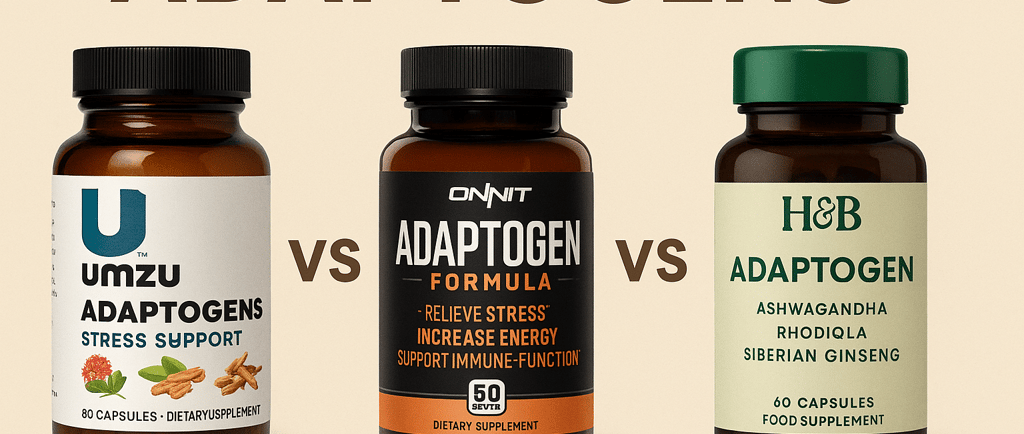Best Adaptogen Brand 2025: UMZU vs Onnit vs Holland & Barrett (Ashwagandha & Rhodiola Compared)
STRESS RESILIENCE ENERGY AND MENTAL STAMINA
Team Alpha
10/19/20255 min read


Adaptogens like ashwagandha and rhodiola are two of the most practical, well-studied herbal tools for stress resilience, energy and mental stamina. But not all supplement brands or extracts are created equal. Below I compare three familiar options — UMZU, Onnit, and Holland & Barrett (H&B) — on value for money, customer feedback, and the clinical evidence tied to the active ingredients and extract types they use. I’ll also summarize the key clinical metrics you should care about (cortisol, fatigue scales, mental performance), expected timelines, and safety cautions so you can choose like a busy professional who wants measured results.
Quick headline conclusions
If you want the strongest clinical backing for ashwagandha itself: look for products using clinically studied, standardized extracts (KSM-66, Sensoril, Shoden) — many H&B products and clinical trials use KSM-66 or similar extracts. Meta-analyses of RCTs support ashwagandha’s ability to reduce perceived stress and lower morning cortisol. PubMed
If you want a brand with lifestyle-focused blends and a strong consumer experience: Onnit packages adaptogens inside performance stacks (e.g., Shroom Tech, Total Human) and scores well on customer service and multi-product lines. Their formulations combine adaptogens with other actives aimed at performance.
If you want low-cost, shelf-brand reliability and easy access (UK/EU): Holland & Barrett carries KSM-66 and other standardized ashwagandha extracts at competitive prices with many customer reviews. Holland & Barrett
UMZU markets directly to biohackers and performance seekers with strong messaging around adaptogens and proprietary blends; their product pages highlight benefits but public independent clinical data on their exact formulations is limited, and the brand has mixed third-party business reviews. umzu
The science you want summarized (what trials actually measure)
When researchers test adaptogens they typically use these objective outcomes:
Perceived Stress Scales (PSS, DASS-21, HAM-A) — subjective but standardized questionnaires used in ashwagandha trials. PMC
Morning cortisol (serum or salivary) — an objective endocrine metric; several RCTs report ashwagandha lowers morning cortisol. PMC
Fatigue / performance scales and cognitive tests — rhodiola trials commonly use validated fatigue instruments and performance tasks; rhodiola RCTs (e.g., SHR-5) show improved fatigue and work/exam performance. PubMed
Meta-analyses / systematic reviews — pooled RCTs show moderate, statistically significant effects for ashwagandha on stress/anxiety and for rhodiola on fatigue/stamina; effect sizes vary by extract, dose and study quality. PubMed
Practical takeaway: For anxiety/stress and cortisol reduction, ashwagandha (standardized extracts used in RCTs) has the better evidence. For acute fatigue and mental stamina, rhodiola trials show reproducible benefit — especially the standardized SHR-5 extracts. PMC
Brand comparison — evidence, value, and customer signals
UMZU
What they sell: UMZU markets an ashwagandha product aimed at stress and cognitive balance and positions itself for the biohacking crowd. Their product pages emphasize adaptogenic effects and practical benefits. umzu
Clinical trial linkage: UMZU’s product pages cite general adaptogen science but I did not find a peer-reviewed RCT specifically testing UMZU’s branded ashwagandha formulation. That means benefit claims rely on ingredient-level evidence rather than trials of the exact product.
Customer reviews & trust: UMZU has vocal fans on sales pages but mixed third-party business reviews (Trustpilot shows lower scores for overall company reviews), which is worth noting for long-term subscription buyers.
Value for money: Mid-range pricing; appeals to people who like direct-to-consumer brands with strong messaging. If you prefer a brand-specific RCT or transparent COA publishing, dig into the site or customer support first.
Onnit
What they sell: Onnit offers several adaptogen-containing products, notably Shroom Tech® Sport (contains rhodiola + cordyceps + other mushrooms) and multi-packs like Total Human that bundle adaptogens with vitamins/nootropics. Onnit markets toward performance athletes and professionals. Onnit
Clinical trial linkage: Onnit often cites ingredient-level research (e.g., rhodiola for fatigue, mushrooms for energy) rather than trials on their specific blend. However, their product pages and reviews emphasize third-party testing and quality control for several items.
Customer reviews & trust: Onnit has a long market presence and generally positive customer service reviews (Trustpilot, independent reviewers). Their multi-product approach and strong brand reputation are a plus for people who want a single vendor for multiple performance supplements.
Value for money: Higher than commodity brands but offers convenience and trusted supply chain; good option if you want adaptogens inside broader “performance stack” products.
Holland & Barrett (H&B) — private/retail brand
What they sell: Large retail chain carrying multiple ashwagandha products — notably KSM-66 formulations and other standardized extracts — often at competitive prices and with frequent promotions. H&B also sells rhodiola products and carries third-party brands. Holland & Barrett
Clinical trial linkage: Many RCTs of ashwagandha used standardized extracts like KSM-66 (root extract) or Sensoril; H&B stocks KSM-66 products, meaning you can buy clinically studied extract types affordably at scale. Zandu Care
Customer reviews & trust: H&B product pages show numerous consumer reviews (many positive for KSM-66 products). Their retail footprint makes returns and replacements easy — a practical advantage. Holland & Barrett
Value for money: Strong — if you want a standardized, clinically supported extract (e.g., KSM-66) at a lower cost and good retail support, H&B is a logical pick.
Clinical trial effects & expected timelines (what the evidence shows)
Ashwagandha (KSM-66 / Sensoril / root extracts): RCTs typically use 300–600 mg/day for 6–12 weeks and report reduced perceived stress scores and lower morning cortisol (significant vs placebo), with subjective sleep and anxiety improvements often visible by 4–8 weeks in trials. Meta-analyses show a moderate pooled effect on stress and anxiety across RCTs. PMC
Rhodiola (SHR-5): Typical trial doses 200–600 mg/day, often in short courses (2–4 weeks for exam/work stress studies), showing reduced fatigue and improved mental performance; some trials show rapid benefits (days → weeks) for acute fatigue. PubMed
Bottom line: expect measurable subjective changes (stress, energy) in 2–8 weeks for most people when using clinically studied extracts at trial doses.
Safety & Practical Cautions
Interactions: Ashwagandha can interact with sedatives, thyroid meds, immunosuppressants and diabetes drugs. Rhodiola may interact with some antidepressants or hypertensive meds. Always check with your clinician if you’re on prescription drugs. Verywell Health
Quality control: Prefer products that publish COAs (heavy metals, microbial testing) and use standardized extracts (KSM-66, Sensoril, SHR-5). H&B’s KSM-66 lines and Onnit’s third-party tested products typically provide better transparency than many small DTC brands. Zandu Care
Dosing & duration: Follow trial-backed doses (ashwagandha 300–600 mg/day; rhodiola 200–600 mg/day). If you try adaptogens, evaluate after 4–8 weeks and consider cycling (some people use rhodiola for daytime energy and ashwagandha at night). PMC
Practical recommendations (for busy professionals)
If you want clinical proof + convenience: pick a product with a standardized extract (KSM-66 or Sensoril for ashwagandha; SHR-5 for rhodiola) — H&B carries KSM-66 options affordably. Holland & Barrett
If you want a single trusted vendor and performance stacks: Onnit is a solid option for packaged, tested blends and excellent customer support. Onnit
If you like DTC, strong marketing & specific blends: UMZU can be useful — but ask for COAs and remember product-specific RCTs are not public for most DTC formulas. umzu.com
Final thought
Adaptogens work — but extract quality, dose, and study design matter. For measurable reductions in stress (and cortisol), choose an ashwagandha product containing a standardized, clinically studied extract (KSM-66, Sensoril, Shoden) and expect 4–8 weeks to see effects. For acute fatigue and stamina, rhodiola (SHR-5) is the better-supported choice. Between UMZU, Onnit and H&B: H&B often offers the best value on clinically standardized extracts; Onnit offers a polished performance ecosystem; UMZU appeals to DTC biohackers but relies more on ingredient-level claims. Pick what fits your budget, verify third-party testing, and track subjective stress/energy measures over 4–8 weeks to know if the product is working for you.
Insights
Expert guidance for health-conscious professionals.
Support
Connect
info@genthealthhub.com
© 2025. All rights reserved.
